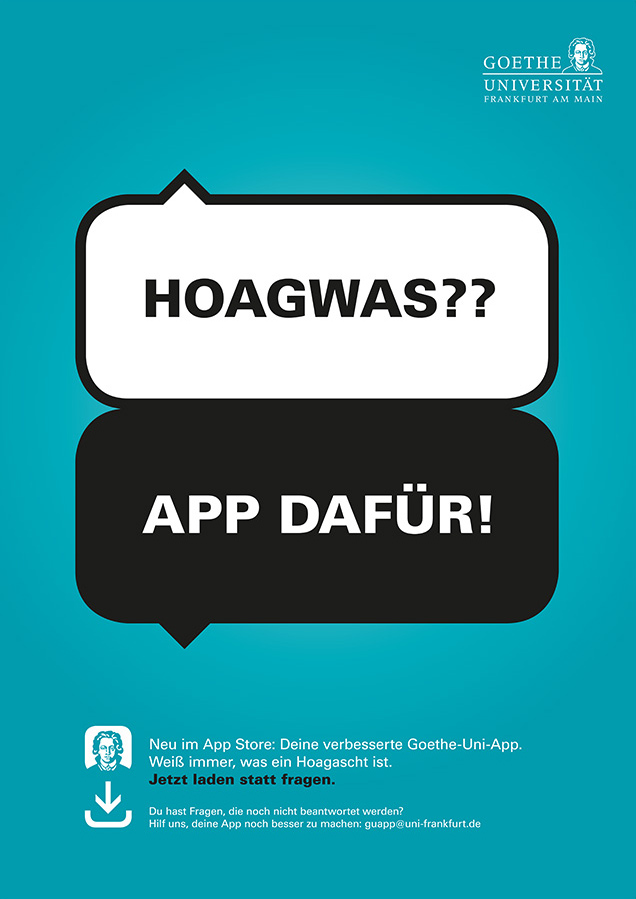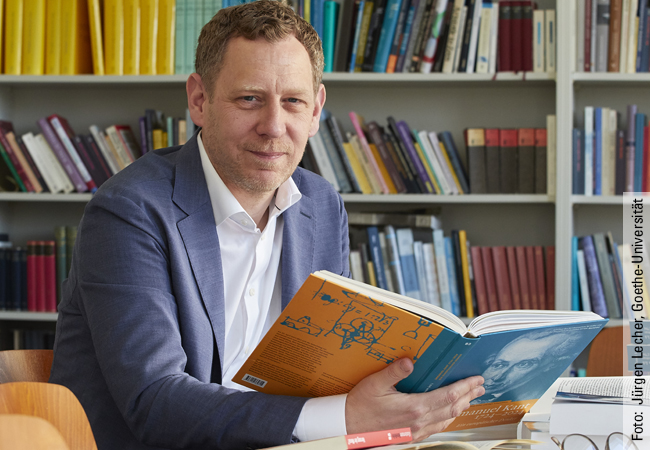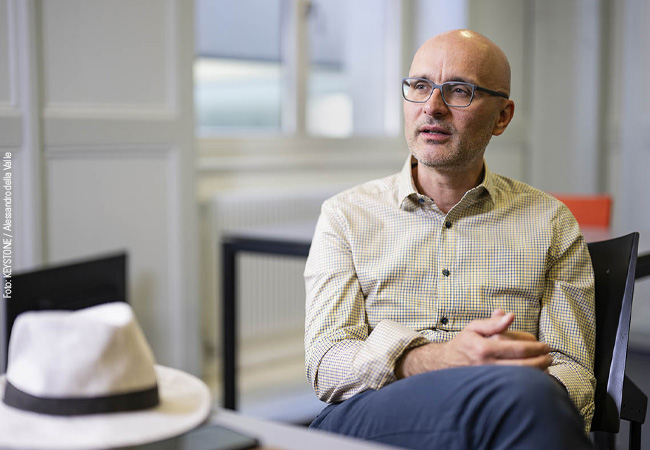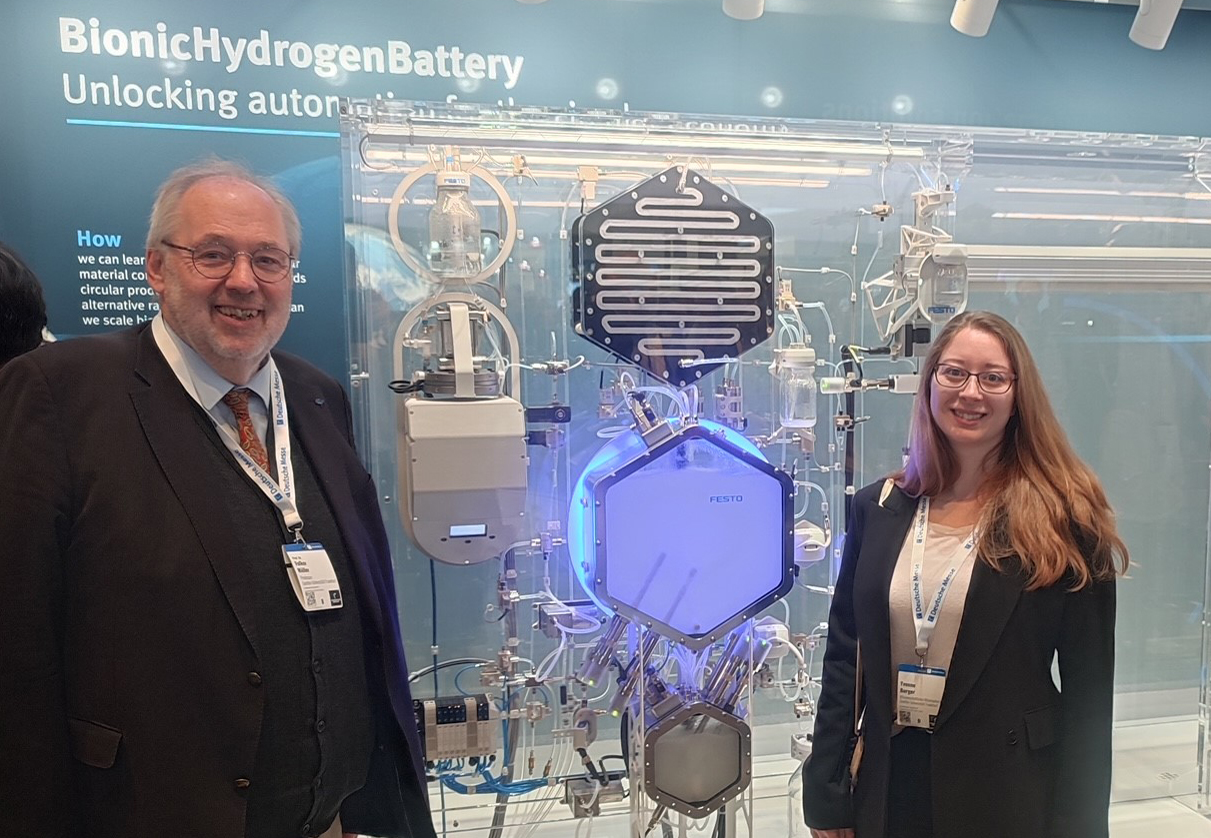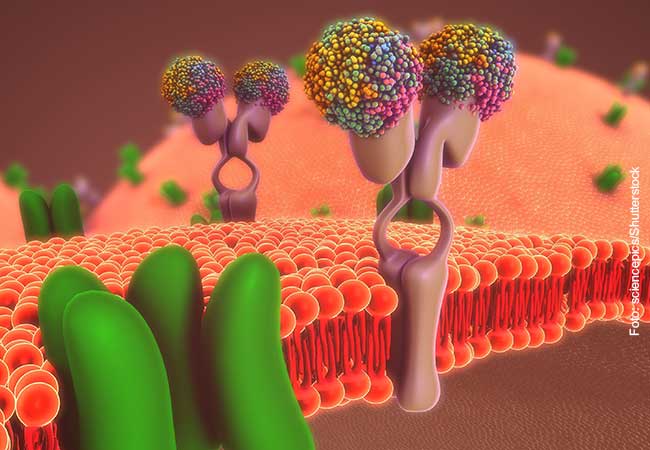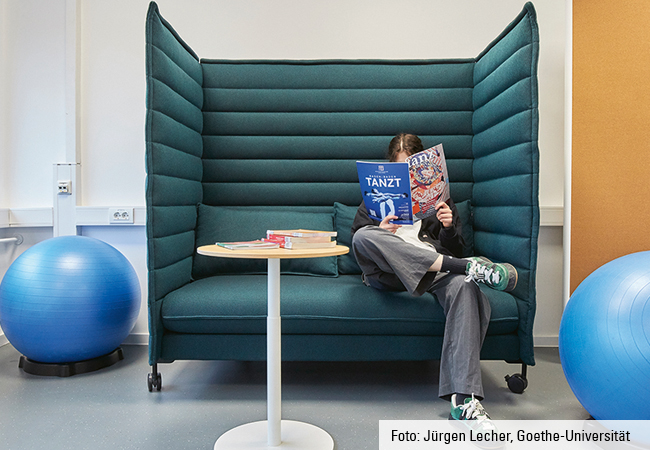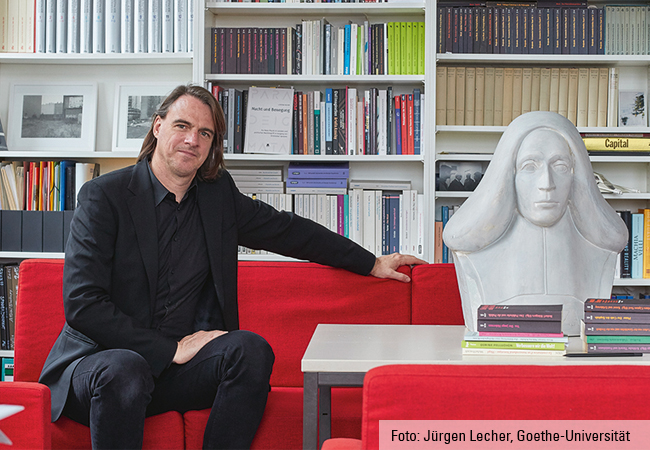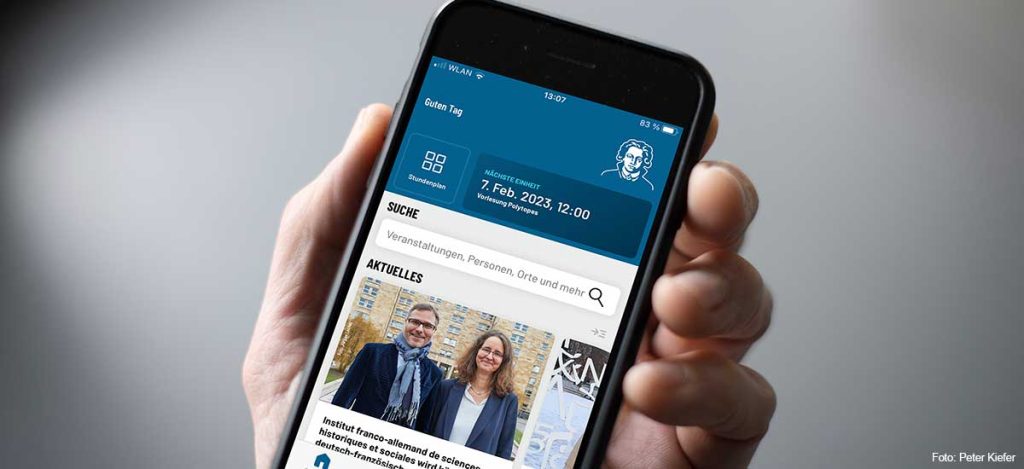
Seit Januar gibt es die Goethe-Uni-App 2.0 zum Download für IOS und Android. Einmal heruntergeladen, lässt sich mit ihr der Uni-Alltag einfacher und komfortabler organisieren. Warum es sich unbedingt lohnt, Speicherplatz auf dem Smartphone für die neue App freizuhalten, und warum ein Hackathon nicht nur etwas für Programmierer*innen ist, erläutert Ulrich Schielein, CIO der Goethe-Universität, im Interview.
UniReport: Herr Schielein, warum sollte ich mir die neue Goethe-Uni-App herunterladen? Ich kann ja auch einfach von unterwegs auf die mobile Uni-Homepage zugreifen.
Ulrich Schielein: Erst einmal ist der Zugriff auf die Inhalte über die App komfortabler, als wenn ich mit dem Handybrowser auf die Website zugreife. Ich kann mir dann die App so konfigurieren, dass die Informationen oben auftauchen, die mich am meisten interessieren. Mit der App habe ich meine aktuellen Studieninformationen immer im Blick, ohne mich immer erst einloggen zu müssen. Wir wollen aber noch mehr: Die App soll für die Studierenden zu einem relevanten Tool werden, das ihren kompletten Tagesrhythmus abbildet und ihren Studienalltag erleichtert.
Die Goethe-Universität hatte ja auch schon vorher eine App. Was ist nun anders als vorher?
Die Version 2.0 hat neben dem moderneren Look & Feel vor allem zwei wesentliche Erweiterungen bekommen: Die eine ist der Login in unser Campusmanagementsystem. Nach dem Login mit dem HRZ-Account können sich die Studierenden dort zum Beispiel einen Stundenplan erstellen und ihre Noten einsehen. Die zweite wichtige neue Funktion ist der Zugriff auf das Konto an der Universitätsbibliothek: Ich kann direkt über die App im Katalog recherchieren, Medien ausleihen und den Überblick über Mahngebühren behalten.
Das heißt, da mussten verschiedene Systeme lernen, miteinander zu »sprechen«?
Genau. Die App besteht an vielen Stellen aus Schnittstellen – selbst wenn ich nur die Speisepläne anschauen will, brauche ich eine Schnittstelle ins System des Studierendenwerks, um die Informationen aktuell (im 10-Minuten-Takt) auslesen zu können.
Zielgruppe für die App sind in erster Linie die Studierenden. Diese können die App nicht nur herunterladen, sondern auch bei der weiteren Entwicklung der App mitwirken. Was ist geplant?

Zeitgleich mit dem Start der neuen App haben wir eine Plattform freigeschaltet (https://tinygu.de/ideen-guapp), über die die Nutzer*innen Feedback geben und Ideen für weitere App-Funktionen vorschlagen können. Wir möchten verstehen, welche Bedürfnisse die Studierenden haben und welche Funktionalitäten ihnen am wichtigsten erscheinen. Auf dieser Basis wollen wir die App dann ziel- und nutzergerecht weiterentwickeln. Nutzer*innen frühzeitig einzubinden, ist ein wesentlicher Erfolgsfaktor bei einer agilen Entwicklung. Im nächsten Schritt werden wir dann im Sommersemester einen Hackathon* veranstalten: Dort haben interessierte Studierende dann Gelegenheit, erste Funktionalitäten im Sinne eines Click Dummys eigenständig umsetzen zu können. Damit können wir zum einen die Funktionalitäten testen. Zum anderen ist der Hackathon aber auch eine tolle Gelegenheit, die eigenen Digitalisierungsskills weiterzuentwickeln. Der Hackathon bietet einen geschützten Raum, wo Studierende aller Fachrichtungen – also nicht nur der MINT-Fächer – so etwas einmal ausprobieren können und sich niemand blamiert. Wir werden entsprechende Räumlichkeiten und Tools zur Verfügung stellen, es wird Vorträge geben, natürlich ausreichend Essen und Trinken – es soll ein richtiges Event werden! Wir wollen damit zeigen: so eine App-Entwicklung ist kein Hexenwerk, sondern das geht relativ einfach und schnell.
Was ist mit den Mitarbeiter*innen an der Goethe-Uni – wird es bald auch spezielle App-Funktionen für sie geben?
Die Goethe-Uni-App ist auch schon jetzt für die Beschäftigten eine praktische Alternative zur mobilen Website, eben weil ich sehr schnell meine Uni-News, Kontakte oder Speisepläne finde. Was weitergehende Funktionen speziell für Mitarbeitende angeht, setzen wir allerdings eher auf unseren geplanten Webrelaunch als auf eine App-Lösung. Unter anderem möchten wir das Intranet dann vom bisherigen reinen Infokanal zu einer echten Arbeits- und Austauschplattform ausbauen. Das ist aber komplexer und benötigt noch etwas Zeit.
»Ich möchte Deutschlands beste Uni-App für Studierende entwickeln«
Nach dem Relaunch ist also vor dem Relaunch. Haben Sie einen persönlichen Anspruch an die künftige Goethe-Uni-App 3.0?
Ja, ich möchte Deutschlands beste und sicherste Uni-App für Studierende entwickeln! Falls wir dafür eine entsprechende Auszeichnung bekommen, wäre das natürlich großartig. Aber viel entscheidender ist, mit jeder Entwicklungsstufe unserem Ziel näher zu kommen, den Studienalltag über die App als zentrale Drehscheibe zu vereinfachen. In dem Zusammenhang soll auch der Austausch unter Kommiliton*innen, zwischen Studierenden und ihren Lehrenden sowie zwischen Studierenden und der Verwaltung vereinfacht werden: Wir wollen über die App sichere, DSGVO-konforme Kommunikationswege schaffen, mit denen zum Beispiel kurzfristig Informationen zur Verlegung von Räumen, Vorlesungsausfällen und so weiter kommuniziert werden können. Außerdem soll es die Möglichkeit geben, systematisch weitere Services aufzubauen. Ein Wunsch von mir wäre beispielsweise, sehbeeinträchtigten Personengruppen über die App Hilfen zur Verfügung zu stellen, um Gebäude und Räume einfacher finden zu können.
Mit der Ideensammlung und dem Hackathon können Studierende an einem Digitalisierungsprojekt selbst mitwirken. Ist das eine Blaupause auch für weitere Vorhaben?
Zumindest für die App kann ich das schon konkret sagen: Auch in den nächsten Phasen der App-Entwicklung würde ich Studierende gerne aktiv einbinden, sie aus der passiven Nutzerrolle herausholen und auch mögliche Berührungsängste beim Thema Digitalisierung abbauen. So können sie spielerisch relevantes Digitalwissen – was steckt hinter so einer App? Wie wird sie entwickelt? Wie gehe ich mit Daten um? – erwerben. Wichtig ist: Damit die App immer besser und wichtiger im Uni-Alltag werden kann, brauchen wir möglichst viele Studierende, die die App herunterladen und uns ihr Feedback geben. Nichts ist perfekt, aber wenn uns ein Bug gemeldet wird, können wir den auch schnell beseitigen. Und, mit Blick auf die nächsten Schritte: Je mehr Studierende mitmachen, desto stärker ist der Nutzen, wenn wir eine richtig gute Kommunikationsplattform in die GU-App integrieren.
Fragen: Imke Folkerts
LADEN STATT FRAGEN:
DIE NEUE GOETHE-UNI-APP 2.0
Über die neue Goethe-Uni-App 2.0 können Studierende unter anderem direkt auf das Vorlesungsverzeichnis zugreifen, ihre Noten einsehen, Funktionen der Unibibliothek nutzen. Weitere Funktionen sind die Personensuche, der Blick auf Mensapläne und aktuelle News aus der Uni.
Am besten gleich herunterladen und ausprobieren:
App Store
Google Play
Besser ist das neue Gut: Alle App-Nutzer*innen sind herzlich eingeladen, Feedback und Ideen für weitere Anwendungen zu schicken (Anmeldung mit HRZ-Account): https://tinygu.de/ideen-guapp
Hinweis: Medizin-Studierende können auf die allgemeinen App-Funktionen und die Services der Uni-Bib zugreifen. Da die Systeme des Fachbereichs Medizin noch nicht integriert sind, sind einige Funktionen (Noten-Einblick und Stundenplan Medizin, Mensa Campus Niederrad) allerdings aktuell nicht nutzbar.
Weitere Infos zur Goethe-Uni-App http://app.uni-frankfurt.de
*Hackathon: kollaborative Soft- und Hardwareentwicklungsveranstaltung (Wikipedia)


